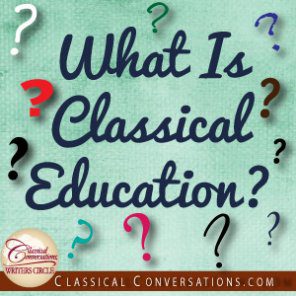The word classical or classic brings to mind a range of images. Some might think of classical music, classical literature, or a bald, bearded philosopher in a flowing robe. Classical education can be summarized simply as a set of skills (the Trivium) and a core content of knowledge.
A classical education is based on the skills described by the Trivium (Latin for “three roads”). These “three roads” are grammar, dialectic, and rhetoric. If I wanted to learn Latin, I would begin with grammar. This first stage of learning the language would involve memorizing the vocabulary. Next, I would arrive at the dialectic stage of Latin, in which I could begin to translate sentences. As a true scholar, I would continue to the rhetoric stage, in which I could read longer texts in the original Latin and even compose Latin prose and poetry myself.
The three stages of the Trivium can even be applied to different stages of a child’s development. Grammar skills involve memorization of facts that students will use in later stages of their education. Young children (ages four through eleven) generally enjoy memorizing and reciting. They frequently memorize television commercials, nursery rhymes, and even entire picture books.
As children mature, they become less interested in memorizing facts and more interested in understanding them. They have moved out of grammar and into the dialectic stage (ages twelve through fourteen). Once again, parents can work with the natural inclination of children by teaching them how to think and argue clearly and respectfully. This provides the perfect opportunity to pursue subjects like logic and debate.
Finally, when students reach the rhetoric stage (ages fifteen through eighteen) they will be interested in self-expression. They can be encouraged to deliver speeches and to teach others what they have learned. They will also learn to compose arguments on paper by refining their ability to write academic essays. The culmination of a classical education is the ability to persuade others of the truth of your arguments.
The skills of a classical education—grammar, dialectic, and rhetoric—can be applied to learning any new subject. However, the pursuit of a classical education also involves the best ideas of western civilization. As in a modern education, students will pursue history, math, science, and literature. Unlike most modern curricula, a classical student reads works by classics such as Plato, Homer, Virgil, and Shakespeare and studies Latin, logic, and philosophy.
______________________________________
Suggestions for further reading:
Sayers, Dorothy. “The Lost Tools of Learning.” Lecture delivered at Oxford University in 1947. http:// www.gbt.org/text/sayers.html
Classical Christian Education Made Approachable. West End, NC: Classical Conversations MultiMedia, 2010.
Bortins, Leigh. The Core: Teaching Your Child the Foundations of Classical Education. New York: Palgrave Macmillan, 2010.




